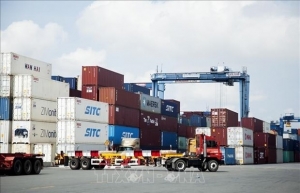Structural reforms needed for medium-term growth
What is the IMF’s assessment on the recovery of Vietnam’s economic growth: is it really positive or not?
 |
| Paulo Medas, mission chief for Vietnam at the International Monetary Fund (IMF) |
After a challenging year, especially in early 2023, the economy rebounded thanks to determined actions by the government. The economy was hit by turbulence in the real estate sector, financial distress, due to the problems at Saigon Commercial Bank, and a significant drop in exports. A recovery began in late 2023, fuelled by a rebound in exports and expansionary fiscal and monetary policy support, as well as measures to stabilise the banking sector.
The recovery continued in the first half of 2024, as economic growth rose to 6.4 per cent, supported by robust exports, increased tourism, and resilient foreign direct investment. Domestic activity has been weaker, but it is also recovering at a more gradual pace, given the still weak real estate sector and highly indebted corporates.
The new land measures, including the new land law, should help the real estate sector recover over time. Inflation has picked up in 2024, driven mainly by rising food prices, but remains around the target of 4-4.5 per cent for this year.
The Vietnamese government is expecting a new growth target of 7 per cent for this year, instead of 6-6.5 per cent set earlier. Does the IMF believe that this goal will be achievable?
The Vietnamese economy has proven quite resilient despite the large adverse shocks. Given the strong performance in the first half of 2024, economic growth is very likely to be above 6 per cent for the full year as a whole, supported by the rebound in exports and the gradual recovery in the domestic economy. Vietnam remains among the countries with the highest growth rates.
However, there are factors and risks that make achieving 7 per cent for the year more difficult. The strong on-year growth in the first half of 2024 partly reflects the weak first half in 2023. It will be more difficult to achieve a higher on-year growth in 2024 as whole.
In addition, there are various downside risks. Exports could weaken, especially if geopolitical tensions intensify. Weakness in the real estate sector and corporate bond market could also hamper banks’ ability to expand credit, hurting economic growth and undermining financial stability. In addition, if inflation were to surprise on the upside, it could hurt private consumption.
In this context, it will be important to ensure that economic growth is sustainable as the large policy support is unwound over time. Having growth above 6 per cent is already very positive, given the domestic economy and the financial system are still recovering from large shocks and the global growth outlook remains modest.
What are the key challenges for the Vietnamese economic growth until the year’s end and beyond?
The key near term challenge is to balance support for the recovery, while managing inflation risks and continuing to restore banking system health. The accommodative monetary and fiscal stances have helped the economy rebound. For example, interest rates have remained near record low levels since the second half of 2023. But, as the recovery gains steam, it is important to closely monitor inflation risks and be ready to tighten policies if needed.
Over the medium term, Vietnam will need to adopt new structural reforms amidst significant challenges posed by ageing and climate change. Sustaining the impressive high growth rates over the last two decades, above other emerging market economies, will require efforts to continue to improve economic policies and reforms.
Continuing to build the resilience of the financial sector remains a priority, which will help sustain economic growth over the medium term. The revision of the law on credit institutions is a significant step forward, but implementation will be critical.
It should be followed by reforms to strengthen bank supervision policies and practices and provide greater legal protection to the State Bank of Vietnam (SBV) staff when fulfilling their mandates.
More efforts are needed to promote higher productivity. Less favourable demographic trends will reduce the growth rate, and climate change will bring new challenges. To offset these, it will be essential to increase productivity, including by adopting structural reforms to improve the business environment and investing in human and physical capital, including scaling up renewable energy.
The Vietnamese government is applying a flexible monetary policy in economic management. What is the recommendation of the IMF, and what policies should be the most appropriate to Vietnam now?
In the near term, the monetary policy will need to navigate supporting the recovery, while remaining vigilant against inflation risks. The current accommodative monetary stance has appropriately supported the recovery.
However, as economic growth strengthens, the authorities should stand ready to tighten monetary policy if inflation pressures intensify and avoid policies to incentivise excessive credit growth.
Looking ahead, as the economy continues to develop further, it will be important to upgrade monetary and fiscal policy frameworks. Accelerating this process would help manage a complex external environment and promote macro-financial stability. Moving towards a more modern monetary policy framework would help strengthen the monetary policy transmission and control inflation, reducing the need for FX interventions, and eliminate credit distortions.
The steps include greater operational autonomy to the SBV, allowing for even greater exchange rate flexibility, and replacing credit growth ceilings and forbearance measures with a sound macro-prudential framework.
 | Vietnamese economy likely to expand by 6.5 per cent in 2024: Economist The Vietnamese economy is likely to expand by 6-6.5 per cent in the base scenario, with even recovery recorded in all sectors of agriculture, industry, construction and services, Dr. Can Van Luc, a member of the National Financial-Monetary Policy Advisory Council, has predicted. |
 | Vietnamese economy proceeding as predicted: experts Vietnam's GDP in the first quarter of 2024 will grow by around 5.5 per cent as predicted, according to experts and thinktanks. |
What the stars mean:
★ Poor ★ ★ Promising ★★★ Good ★★★★ Very good ★★★★★ Exceptional
Related Contents
Latest News
More News
- Citi economists project robust Vietnam economic growth in 2026 (February 14, 2026 | 18:00)
- Sustaining high growth must be balanced in stable manner (February 14, 2026 | 09:00)
- From 5G to 6G: how AI is shaping Vietnam’s path to digital leadership (February 13, 2026 | 10:59)
- Cooperation must align with Vietnam’s long-term ambitions (February 13, 2026 | 09:00)
- Need-to-know aspects ahead of AI law (February 13, 2026 | 08:00)
- Legalities to early operations for Vietnam’s IFC (February 11, 2026 | 12:17)
- Foreign-language trademarks gain traction in Vietnam (February 06, 2026 | 09:26)
- Offshore structuring and the Singapore holding route (February 02, 2026 | 10:39)
- Vietnam enters new development era: Russian scholar (January 25, 2026 | 10:08)
- 14th National Party Congress marks new era, expands Vietnam’s global role: Australian scholar (January 25, 2026 | 09:54)

 Tag:
Tag:



















 Mobile Version
Mobile Version